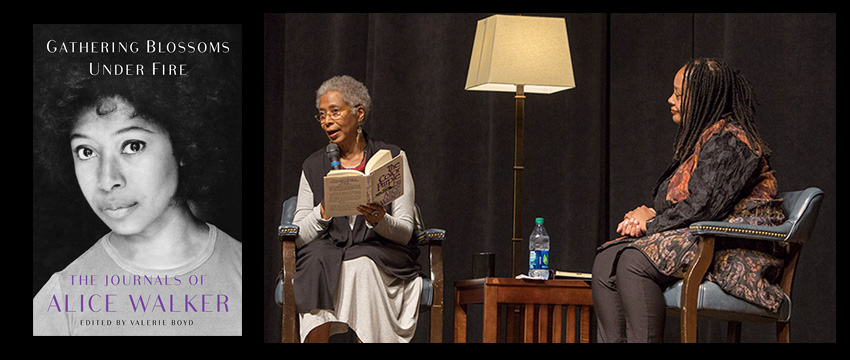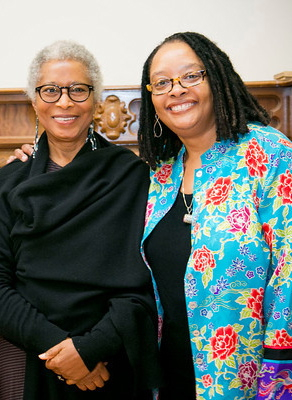“Gathering Blossoms Under Fire,” edited by Valerie Boyd, is published

“Gathering Blossoms Under Fire,” edited by Valerie Boyd, is published
On this bittersweet day, “Gathering Blossoms Under Fire: The Journals of Alice Walker,” a book edited by Valerie Boyd, is published nearly 10 years after the project began—and, two months after Boyd’s death.
“If there was ever an editing role for Valerie, this was it,” said Moni Basu, Boyd’s friend of nearly 30 years. “Like Alice, Valerie was so strong and such a masterful writer. It seemed like a perfect fit.”
Basu remembers the night that Boyd offered to help Walker with the project. Walker was in town to lead a program at Spelman College that Boyd moderated, and Basu, who was working at CNN at the time, interviewed Walker after the talk.
“I remember the three of us were in an informal conversation and Alice was talking about going over to Emory to look through her papers and she was talking about what a daunting task that was. There were boxes and boxes of papers and journals and Valerie asked Alice, ‘why are you doing that alone?’ I said, ‘yeah, you need an editor’ and that was the start of conversations of what this book might look like.”
Boyd was so excited about the publication of the book, according to Basu. Basu said Boyd was influenced by three great Black female writers. Boyd became a writer because she was inspired by the writings of Toni Morrison. Zora Neale Hurston, who was the subject of Boyd’s book, “Wrapped in Rainbows: The Life of Zora Neale Hurston,” was another idol. With Walker, Boyd knew it was her calling to help another one of her idols.
“Alice was one of Valerie’s idols and the opportunity to edit her idol’s work through such personal writings was an incredible honor for Val,” Basu said.
Rosalind Bentley, another close friend of Boyd’s, recalled how she would spend hours at the Emory University Manuscript, Archives, and Rare Book Library combing through Walker’s papers.
“I know it was a labor of love and a joy for her to do this work,” Bentley said. “I remember once that she found this passage where all the Black female titans were there at a dinner. Alice Walker and Toni Morrison and a couple others, and Valerie was just thrilled to find entries like that.”

Basu continued: “It was Valerie’s mission to get involved with what she saw as worthy projects by women of color. It doesn’t matter if it was Alice, or her students in the MFA writing program—Valerie felt that helping and mentoring women of color was her life’s calling.”
Bentley vividly remembers a work day at Boyd’s house when the galley proofs for the book arrived. She remembered that Boyd wasn’t feeling well that day.
“Val opened that package and she pulled out that galley and the look on her face—she smiled even through all the pain, and she was so happy,” Bentley said, between emotional pauses. “She knew it was real and it was happening. It was this book that was so special.”
Through the years, the loving bond between Walker and Boyd grew and there was deep mutual respect.
“For Valerie, to have her name on the same cover with Alice’s name was a dream come true,” Basu said. “It is so sad that she can’t be on stage with Alice and hear the accolades.”
Walker reflected on Boyd’s contributions to the book in a remembrance by the publisher at the time of Boyd’s death: “This was a major feat, a huge act of love and solidarity, of sisterhood, of soul generosity and shared joy, for which she will be remembered; as she will be remembered with immense gratitude for her extraordinary biography “Wrapped in Rainbows” of our revered and irrepressible Medicine Ancestor, Zora Neale Hurston.”
“Gathering Blossoms Under Fire” is published by Simon and Schuster and provides in-depth reflections of some of Walker’s most harrowing journal entries. Events include marching in Mississippi with other foot soldiers of the Civil Rights Movement, led by Martin Luther King, Jr.; her marriage to a Jewish lawyer, defying laws that barred interracial marriage in the 1960s South; an early miscarriage; writing her first novel; the trials and triumphs of the Women’s Movement; erotic encounters and enduring relationships; the ancestral visits that led her to write “The Color Purple;” and winning the Pulitzer Prize.
Boyd talked about the book project in a 2015 interview with Grady College.
“I feel honored that Alice Walker is entrusting me to read her journals and to edit a selection of them for the world to read as well,” Boyd said.
Boyd was the founder and director of the MFA Program in Narrative Nonfiction and the Charlayne Hunter-Gault Distinguished Writer in Residence at Grady College. She was editor-at-large at the University of Georgia Press and senior consulting editor for “The Bitter Southerner.” Prior to her February 2022 death, Boyd was named to this year’s class of inductees into the Georgia Writer’s Hall of Fame. Boyd’s final book, “Bigger Than Bravery: Black Resilience and Reclamation in a Time of Pandemic,” is an anthology due out in September 2022.
According to Bentley, it was Boyd’s love for Walker and respect for her writing that led her to work on this project.

“Valerie believed in Alice,” Bentley said. “She believed in Alice as a person and she believed in Alice as a writer and she wanted to make sure the work of Black female writers was recognized—that their names were part of canon, not an addendum to the canon. She believed that we are not a separate category of writer. She believed that Alice Walker is a great American writer, period. Valerie wanted to ensure that Alice’s legacy was cemented and that Alice also would have an opportunity to speak for herself in letters or entries that were written in real time and she wanted that witness on record.”
Boyd concluded her 2015 interview with reflections of what it meant to work with Walker on this project.
“It means everything to have the opportunity to work with her,” Boyd said. “Alice changed American literature in significant ways and has had a major influence not just on me but on many writers of my generation, and subsequent generations, and on American literature itself. It’s a wonderful gift to have the opportunity to walk side by side with her.”